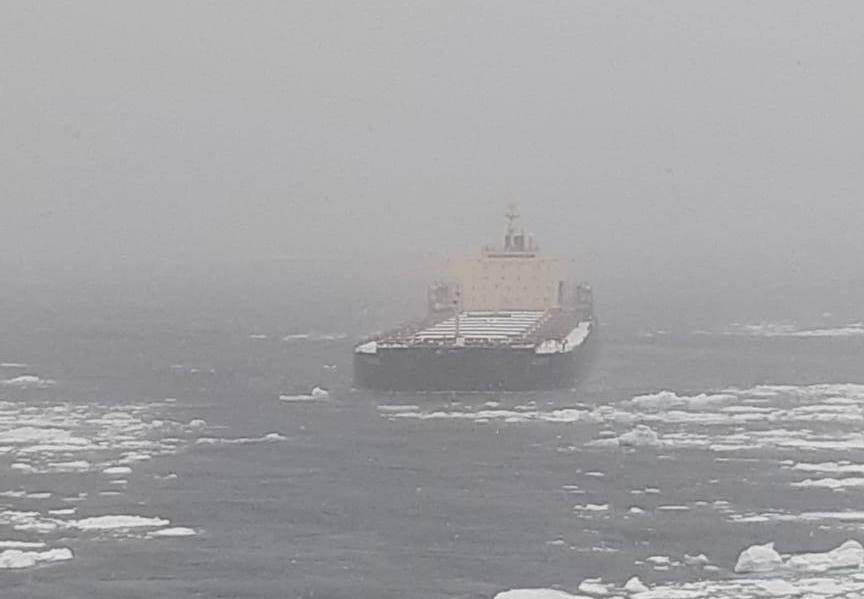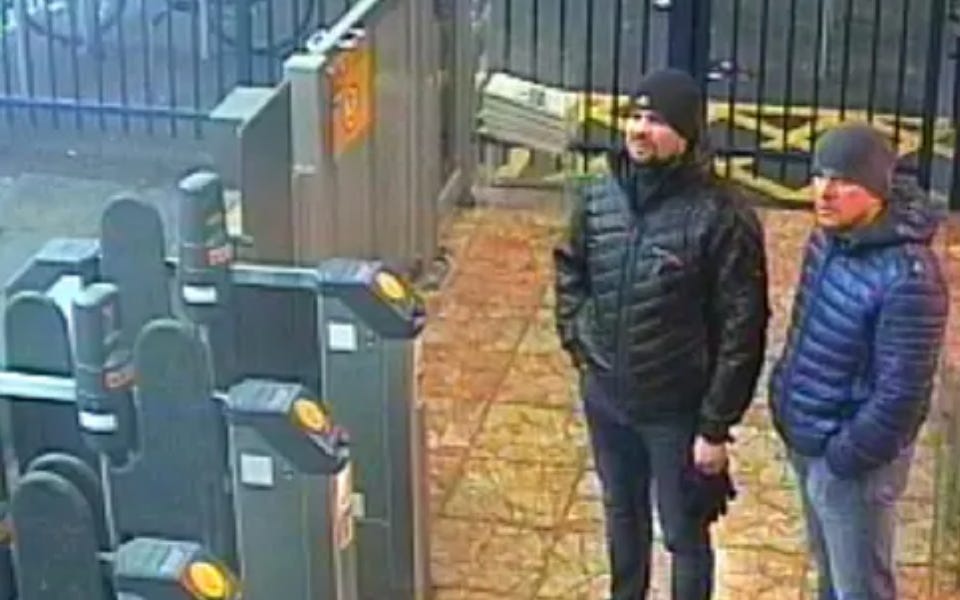In March 2018, when a British investigation found two Russian agents travelled into the city of Salisbury and used a chemical weapon to assassinate a British citizen, the United Kingdom asked Canada’s foreign affairs department to stand against the egregious foreign interference, by expelling Russian officials.
But instead, Global Affairs Canada advised the Trudeau Government not to deport Russian diplomats, fearing Canada’s commercial interests in Russia would suffer, according to a top secret June 2019 draft report from NSICOP.
In the case, on March 4, former Russian spy Sergei Skripal and his daughter Yulia were found nearly dead on a park bench in Salisbury,
poisoned by Novichok, a deadly nerve agent produced by the Soviet Union.
The pair
survived Russia’s attempted murder, which in hindsight, forecast increasing hostile state activities against democracies, including Canada.
Meanwhile, according to NSICOP’s report, on March 20, 2018 — the same day that Britain’s government expelled 23 Russian diplomats — a national security committee in Ottawa met to consider “past case files of Russian individuals in Canada that may have died suspiciously.”
The Bureau’s analysis of these sensitive findings in a case study called “Russia and the Salisbury Incident” underlines concerns running throughout the NSICOP report’s broader examination of Canada’s lax response to growing interference from a handful of nations, predominantly
China, followed by Russia, and then India.
While India’s diaspora interference is in headlines internationally after Prime Minister Trudeau alleged last week — without providing evidence — that India could be linked to the June 2023 murder of a Vancouver-based Sikh separatist leader, NSICOP’s 2019 report shows that China’s mounting threats to Canadian institutions are in a unique category of severity and scope.
At the same time, according to NSICOP, a bipartisan national security body reporting directly to Trudeau, the causes underlining Ottawa’s weakness on foreign interference from China, Russia and
India are related.
For one, Global Affairs has often valued trade and political engagement with these nations over strong measures to protect Canada’s security and support allies — as NSICOP’s Salisbury study shows.
Findings in the Salisbury case also resonate with another larger NSICOP finding — demonstrated in a review of Ottawa’s
neglectful response to Beijing’s secret police operations — that intelligence-led efforts within Ottawa to learn from critical national security incidents and organize “whole of government” responses, have faded out and failed to trigger stronger laws.
Finally, The Bureau’s exclusive analysis of NSICOP’s 2019 report highlights that similar to China, Russian intelligence seeks to shape Ottawa’s policies via tentacles into Canadian media and deep infiltration of federal politicians, political aides, and senior bureaucrats — an uncomfortable finding that perhaps, raises questions of external influence underlying Ottawa’s languid posture on foreign interference.
In one shocking example, NSICOP’s report says “a specific Russian Federation Intelligence officer maintained numerous relationships with Parliamentary staff and political aides.”
Citing a June 2015 CSIS report, NSICOP says “the officer cultivated a former aide to a Senator who then ‘supplied the officer with the names of senior Canadian officials who could be useful, and were ‘friendly to the Russians.’”
In another case, citing a June 2018 CSIS report, NSICOP says an unidentified Member of Parliament had “close contact” with the Russian Embassy in Ottawa.
“The MP used office staff to broker meetings with Embassy officials,” NSICOP says, adding “the MP’s staff also reported political information to the Embassy [and] these contacts were masked from the political party.”
“Protect its commercial interests in Russia”
Ultimately, on March 26, 2018, Foreign Affairs Minister Chrystia Freeland overruled some of her department’s advice, announcing the expulsion of four Russian diplomats.
Her statement said they were “intelligence officers or individuals who have used their diplomatic status to undermine Canada’s security or interfere in our democracy.”
As NSICOP notes, Freeland also said “Canada fervently supports the measures that the United Kingdom has taken so far.”
But Canada’s propensity for at best, lukewarm foreign interference responses, came out in the days and weeks after the Salisbury incident.
According to NSICOP, “in response to a request from the United Kingdom for solidarity in expelling Russian officials,” Global Affairs Canada’s recommendation for Freeland was this: “It is critical that Canada be able to maintain consular services and protect its commercial interests in Russia.”
The briefing note, titled “Canadian Response to Ongoing Hostile Russian Acts” — concluded Global Affairs was “not recommending expelling Russian diplomats from Canada at this time.”
While Freeland’s top bureaucrats recommended against angering Russia in response to Salisbury, other departments in Ottawa were considering whether Canada could face, or already may have faced, similar attacks from Russia.
On March 20, 2018, a national security committee gathered to discuss how the Salisbury incident fit into broader concerns.
“The agenda item included two parts: a presentation by the RCMP and Canadian Armed Forces on how government would respond to an attack using chemical, biological, radiological or nuclear material inside of Canada,” NSICOP’s report says. “And an update from the RCMP on its review of ‘past case files of Russian individuals in Canada that may have died suspiciously.’”
NSICOP’s report doesn’t provide any further information, such as how many deaths the RCMP deemed suspicious or when they occurred, or whether Russia could have plausibly been involved in deaths on Canadian soil, or how Canada’s government has responded to this information.
NSICOP’s explanatory notes on this meeting only say that Trudeau’s Privy Council Office “neither confirmed nor denied that these discussions occurred.”
Nevertheless, the meeting was followed in April by a broader departmental gathering convened by Global Affairs Canada.
This included CSIS, Privy Council Office, Public Safety Canada, Department of National Defence, CSE, which is Canada’s signals intel-agency, and also RCMP and Fintrac, Canada’s anti-money laundering agency.
These gatherings continued into June 2018, NSICOP says.
The focus was developing a rapid response playbook for “hostile Russian activity.”
Global Affairs documents said given that “additional acts designed to undermine the international rules based order will occur,” the group’s future meetings were to be “more focused and designed to provide clear guidance on specific issues, including the development of options, relating to Russia.”
Next, on June 20, 2018, the focus was expanded beyond Russia into an “interdepartmental meeting on Canadian responses to hostile state activities,” that included planning with other G7 nations and “mapping of hostile state activities.”
But this forward-thinking, intelligence-guided, whole-of-government session, conceived to mitigate serious foreign interference incidents predicted by CSIS to become more pervasive, especially with regards to China, appears to have died on the vine.
“The Committee has no information that this group met after its initial June 2018 meeting,” NSICOP’s June 2019 document says.
Media manipulation
NSICOP’s report explains that Russia has interfered in Canada for decades, seeking to weaken Western democracies, promote its geopolitical interests and ensure survival of its regimes, using “its intelligence services, current and former senior political figures, diaspora and compatriot groups, cultural and economic entities, the media and diplomatic officials.”
And in Canada, before and after the Salisbury incident, Russian intelligence and Canadian reporters have been linked in unsavoury cooperation.
According to NSICOP, after “a British investigation revealed [Skripal and his daughter Yulia] had been poisoned by a nerve agent smeared on their front door by Russian intelligence agents” — inside Canada, Russian intelligence was busily leveraging media against the British government.
While Britain rallied for support, “a Russian diplomat in Canada was actively conducting foreign interference activities, including manipulating media coverage of the poisoning to raise doubts about the veracity of the investigation,” NSICOP says.
The report says over a period of several years this unidentified diplomat “maintained contacts with numerous Canadian journalists who supplied him with requested information.”
And the same diplomat also befriended, “a Canadian journalist with extensive contacts in major Canadian publications,” who “assisted him,” in the Salisbury case.
Citing a June 2018 CSIS report, NSICOP says: “In March 2018, the journalist contacted the diplomat ‘to ensure that the ‘facts’ were correct before the journalist published an article critical of Canada’s support for the UK position [that Russia had poisoned Skripal.]’”
The same diplomat has also used Canadian journalists in broad disinformation operations targeting Ukraine according to NSICOP.
Citing a June 2018 CSIS report, NSICOP says the diplomat “used his media contacts to publish articles under his own name (i.e. without attribution as a Russian diplomat) critical of the Government and its policies on Ukraine, or ‘alternative’ explanations of a number of events.”
And this diplomat also “provided his views to personal friends in Canadian media, who regularly repeated them without attribution,” and “leaked information and documents to Canadian journalists in efforts to disseminate Russia’s position.”
While the diplomat isn’t named, former Ottawa-based Russian Embassy spokesman
Kirill Kalinin, one of four diplomats expelled following the Salisbury poisoning, reportedly engaged with some Parliament Hill reporters.
Meanwhile, Kalinin has also been linked in media reports to Russian efforts encouraging journalists to run damaging stories on Freeland’s family history in Ukraine, specifically, that her grandfather was editor of a Nazi newspaper.
Citing two CSIS reports on the matter, including a January 31 2017 document called “National Security Advisor Briefing to Global Affairs Minister” — the June 2019 NSICOP report says: “Russian officials attempted to publicly discredit Canada’s Minister of Foreign Affairs by publishing and disseminating a news article alleging that her maternal grandfather was a Nazi collaborator during the Second World War.”
[email protected]



www.ctvnews.ca

 gcaptain.com
gcaptain.com

gcaptain.com


